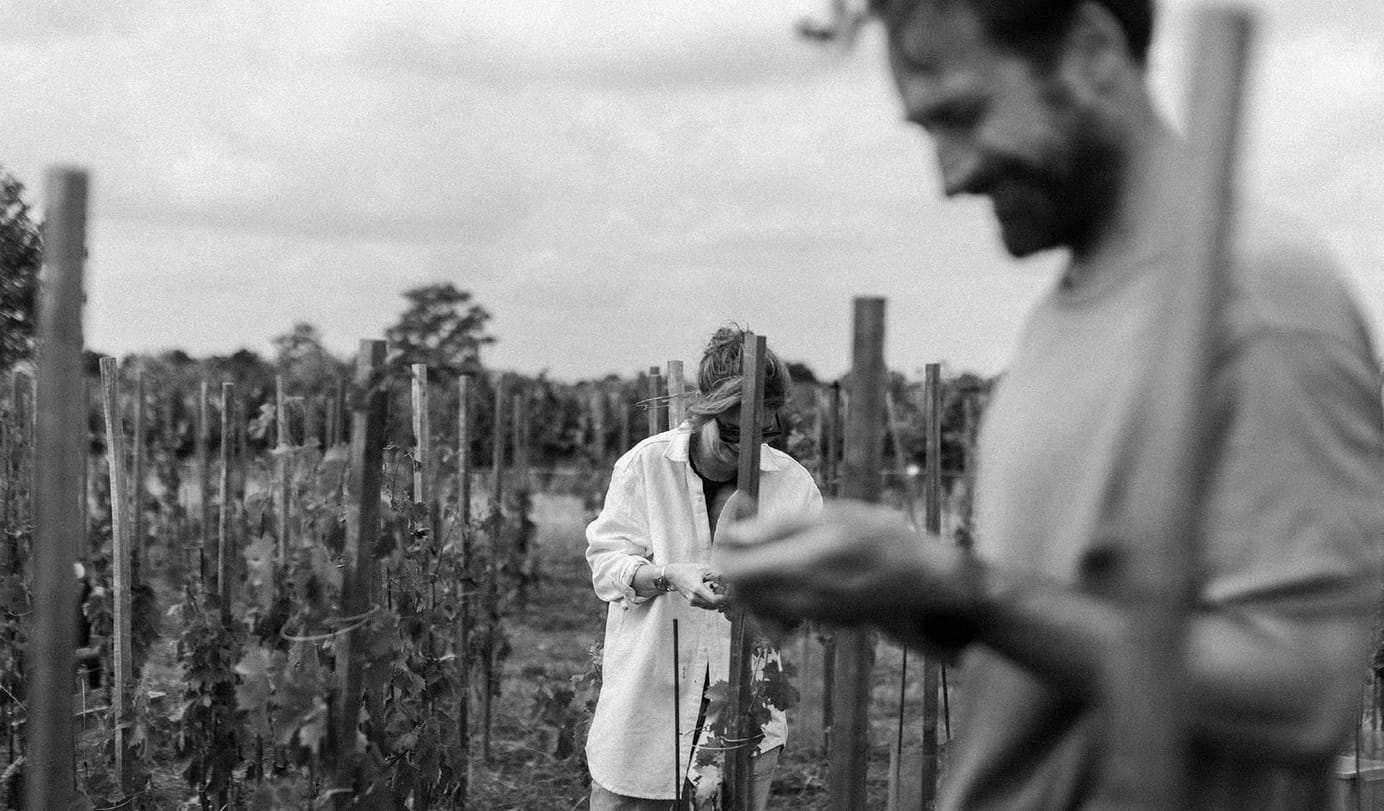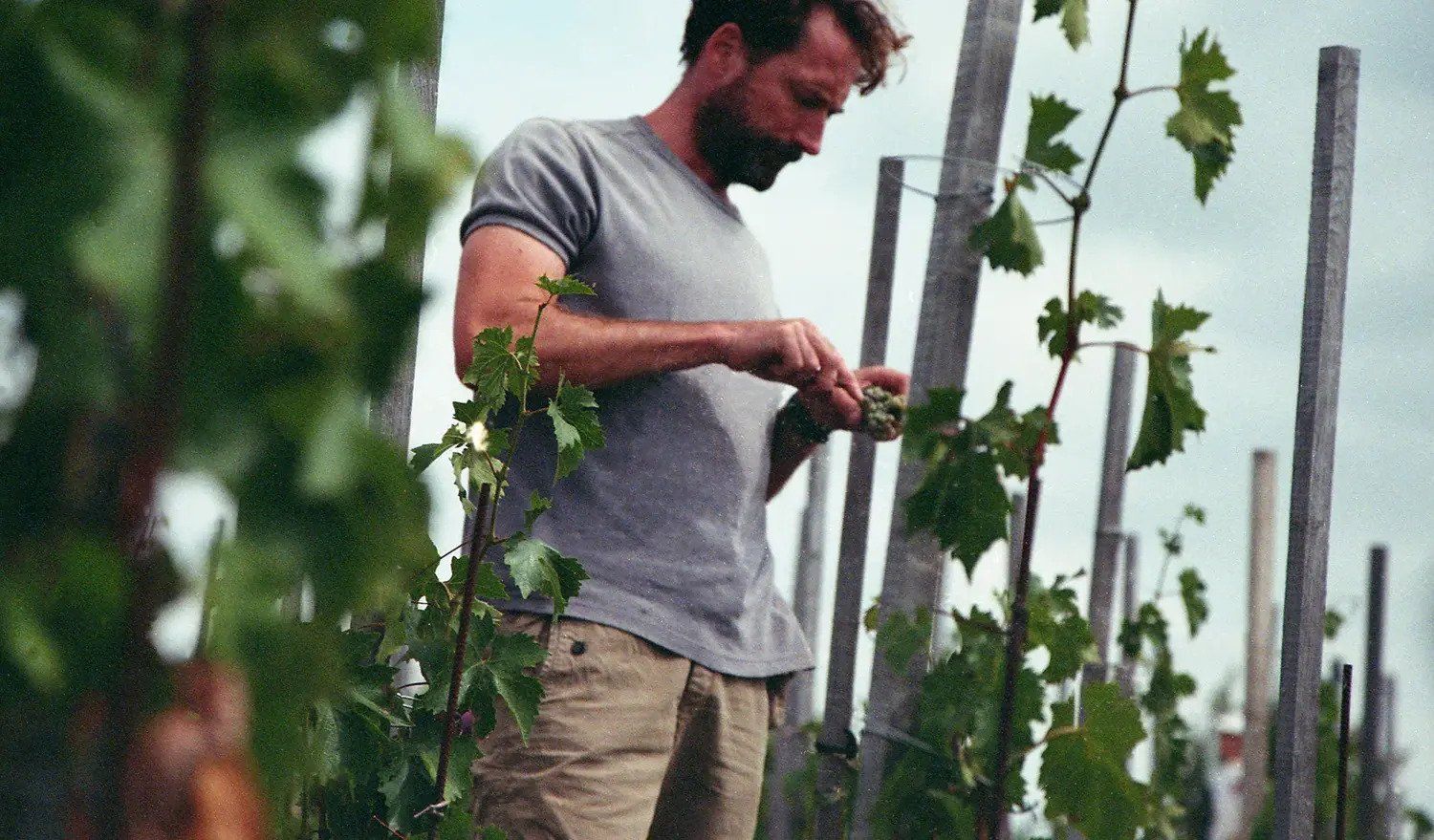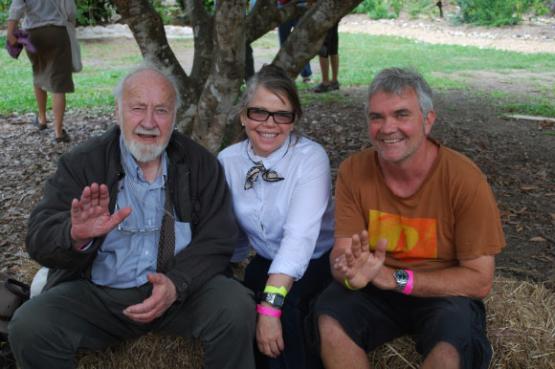
Meet the winemaker: Gut Oggau
9 min read
Gut Oggau is a winery run by Stephanie and Eduard Tscheppe-Eselböck in Oggau, out of Austria's Burgenland. They founded the winery after taking over an established property in 2006, and now cultivate 26 hectares of vineyards using biodynamics.
We had the chance to speak with Stephanie and Eduard about their work. We hope you enjoy reading our conversation.
Can you tell me about your background - how you came to be a winemaker, and what influenced your style of farming and producing?
Stephanie: We are based in Austria in the beautiful Burgenland where we bought the estate at the end of 2006. We had our first vintage in 2007 and since then, we have been producing biodynamic and Demeter certified wines.
Eduard: I come from a wine growing background and my parents used to grow wines in Styria, but in a conventional way. I was never trained to be a wine grower or maker, and studied business administration while helping out at home. But I met my beautiful wife.
Stephanie: And it's such a long time ago, I can't even remember!
Eduard: But when I met my future wife then, I quickly asked her to marry me and she said yes, luckily, I moved to Burgenland and the only thing we knew was that we wanted to do something together. It wasn't always wine - we could have opened a wine bar or restaurant, because Stephanie has a background in hospitality. But we think looking back, we were looking for a place to create something, and that place was probably also looking for us. Everything kind of fell into place.
Why did we work biodynamically? Probably because we felt the need, for those old vineyards we took over to get them back in shape, into vitality, to go for the most sensitive approach. And why natural wine? Because we needed to have a wine without any makeup, because the former owners didn't produce wine, they only sold the grapes. So we needed to find out about their potential in a very, let's say, naked way. That's why we didn't intervene in the winemaking originally. There wasn't really a master plan before we took over the estate, more than one thing happened after the other because of the place, and probably because of us creating a vision driven by its potential.
It was clear from the beginning that we would go for biodynamic certification, but mainly for the sake of being part of a group of interesting biodynamic farmers. And in Austria, there are quite strict rules in wine - for instance, if you want to be Demeter certified, you have to go for natural fermentation.
What was the natural wine landscape like back then and how has it evolved since?
Eduard: The term natural wine didn't exist in 2006. The concept was taking baby steps, but there weren't any discussions between wine growers gathering together to discuss the idea of producing wine naturally. There were some wineries converting to biodynamics, without necessarily working naturally in the cellar, but there was certainly something in the air.
Now of course, the idea of natural wine has been established. There’s growers coming into the movement in Austria, but from our understanding, the ones taking it really seriously - the 100% natural way - haven’t grown in number all that much. There’s a lot more potential in Austria for people to really jump into the refreshing cold water of the natural wine world, without any risk of drowning.
How has your winemaking evolved in that time?
Eduard: In the first year, our maceration was quite classic - white wine was directly pressed and red wine was macerated on the skins. In 2016, we started using the same treatment for both reds and whites. It’s always part macerated on skins, part directly pressed - and then we blend according to the feeling of the vintage. The more structured vintages, the more structure we aim for in the wine and vice versa with the more lean or fragile vintages. It’s all about balance between structure, freshness and minerality.
Can you describe the vineyard and its surroundings?
Eduard: We work on 26 hectares of vineyards at the moment - two of them are young vines, not in crop yet, and 24 are quite grown up vines. Most are between 40 and 70 years old. That's quite interesting in our area because we are on the west bank of this lake. We have quite diverse soil types here so there's vineyards on the flat land mainly on gravel soil, which is rather poor - there's no loam, no concentration. And then we have those hillsides mostly facing east, southeast, towards the lake, which is mainly limestone from ancient mussel reefs and some rocks. On top there is mostly sand, so it's also quite poor soil.
We have many different parcels all over, and that's quite typical of our area. Historically, this has been part of the Austro-Hungarian empire and the law claimed that each child would get a piece of land, rather than just the oldest child claiming all the land. So it means that the pieces of land have gotten smaller and smaller over the generations, so we have more than 60 vineyards around the winery. We decided from the beginning to not go into the single vineyard/single grape varietal approach, but to blend each vineyard with the same identity, the same character and the same soil. We base our vineyards more in terms of personality, than say the grape variety.

How has your work in the field evolved?
Eduard: Every year is a huge evolution - we gain experience, learn and reconsider all kinds of things. In the early years, we took a very cautious approach to biodynamics. We treated the vineyard with sulfites if necessary, and copper - which is hardly ever necessary in our area. But then we got more and more into the idea of strengthening the plants with herbal extracts, which helped us to lower the level of sulfites and copper usage.
The next step was to integrate this microbiome-like approach in the vineyard - recognising the importance of microorganisms in the soil - and that led us to not only producing compost, but working with a lot of compost extracts both on the plants and the soil. It’s all about strengthening the ‘microbiome’ and as a result, improving their vitality. That’s certainly been a very important step. Another incredible step forwards in the last three years has been working with horses in the vineyards, and there’s much more to come.
I would say we started out caring about the vines and now, we consider ourselves farmers. We cultivate the land and are working to create more of an ecosystem.
Would you say your relationship to the vines has changed over the years?
Eduard: We never approached our vines to be like milking cows - we were always grateful for what we got from them, so we never pushed them in a certain direction.
Stephanie: Now though I have to say, there’s a desire to change the world that’s getting stronger and stronger. It’s something that drives us every day. That’s the reason he gets out of bed in the morning now rather than, say, producing the best wine. It’s about giving back more than what we’re taking.
Eduard: If you go into the deeper meaning of what agriculture really is, it has a certain spiritual effect on you. The soil is like mother nature telling you that if you treat it well, you’ll open up more and more opportunities. It’s an opportunity to showcase what’s possible and help people understand how we can make the world a better place - to heal it. It’s something everyone can contribute to and the good thing about vineyards is that, you’re literally creating a message in a bottle. What the vines gives us can be shipped all over the world where it can inspire people. When you open a bottle of our wine, you feel this incredible sense of place, of time, and the humble impact of ourselves. We put a lot of energy, love and passion into these wines and you don’t necessarily have to explain them. You can feel that something special, those forces of nature all bundled into the bottle. It’s a very humbling, very pleasing thing to be able to work with plants that have such incredible potential.
Would you say your relationship with nature has been enhanced since you’ve been working with horses?
Eduard: Definitely. For us, it’s been a kind of missing link. The energy animals bring is so important for a natural, holistic circle. If you have artisanal wines and vineyards worked by people who care about them, that adds a lot of vitality, but having animals present adds another dimension.
Rudolf Steiner looks at life as a pyramid: minerals are at the base, which is dead matter that still has a certain reception for cosmic energy; then plants, which are stuck in place and have consciousness, though limited; then animals. Some animals have individual consciousness, but many have a kind of group consciousness - like a beehive or a herd of cattle. They can move and interact with each other in a way that’s very different from plants, and they have more obvious feelings.
At the top of the pyramid is humans, and we have the capacity to really connect with the animals’ higher energy. Working with the horses, the pyramid is complete. It’s a huge step forward for us.
What adjustments have you had to make because of climate change?
Eduard: In Austria, the figures are not so much different on average. But the recent year has been really dry and it’s those extremes that are the challenge. If we manage to build up a certain layer of humus, it can hold onto water and nutrients. It’s the best food for all the microorganisms. That’s the main investment we have to make - to build the humus up - through decent doses of compost and breaking the monoculture system with trees and bushes to create a more attractive soil.
A softer adjustment we’ve had to make is to our mindset - that’s a hard thing to do for many farmers, and for good reason as you have to get out of your comfort zone and see things in a different light. For example, the most challenging situation we’re facing is the water management and how we’ll cope with that. The most obvious solution is to dig deep into the ground and go for irrigation, but if there’s no water coming, there’s no option to take it from the ground. We have to find other ways, rethink the way we plan the vines and how we can protect the water there as well as possible. You have to be ready to invest energy and resources to make your future work.
How has your relationship to harvest and vintage changed over the years?
Eduard: In recent years, our feeling towards harvest has changed. We contribute so much on a daily basis to making the vineyards and the soil feel comfortable that, when it comes to harvesting, the grapes always turn out very balanced and harmonious, whatever the situation that vintage. So now we always say that it’s going to be alright, because we’re doing everything we can.
This headspace gives us a lot of relief, because we don’t waste a single thought on what the wine will taste like. If we continue to work the way we do, it will all turn out alright. The harvest is just the icing on the cake - we spend the rest of the time baking it. Of course, you have to be super focussed still and only pick the berries when they are perfect, but we don’t have to worry about whether the fruit will shine through in the wine because we know it will. There’s a certain trust we’ve gained in our vineyards.
Does this carry through to your vinification?
Eduard: Totally. We can talk about natural wine, but we’re talking about living wine. The mindset you have is a treatment in itself. If you’re always stressed around your barrels, there will be little creatures in there getting stressed as well - although modern people might not accept this. Everything is connected and mindset is so important. You don’t need to be a life coach to understand that the way you approach things is how they will turn out in the end.
We had a beautiful start with our wines, but it’s only been 16, 17 years that we’ve been working with our vineyards. In the life span of a vine, that’s nothing. Even now we are only just at the very beginning. That’s the beauty of the journey. If we continue to work as we do, if we learn our lessons along the way, the next vintage will always be better and more expressive, more energetic because we have another year where we can contribute to the natural balance of it all - and it’s never going to end.
If you asked us 10 years ago, would we work with horses in the vineyard? Would we do this? Would we do that? We never would have dreamt of these things. But it all just naturally came. It took a while for ideas to develop and be fulfilled, but it’s all been a natural evolution and that’s something we will always continue.
Is there anything else you’d like to share with our readers?
I think it’s important for people to feel encouraged to talk about wine and how it’s made, to ask questions - even if it feels like the question you want to ask is stupid, there are no stupid questions. Even on our side, we are learning something new every year.
Visit Gut Oggau's RAW WINE profile to learn more about the winery.


